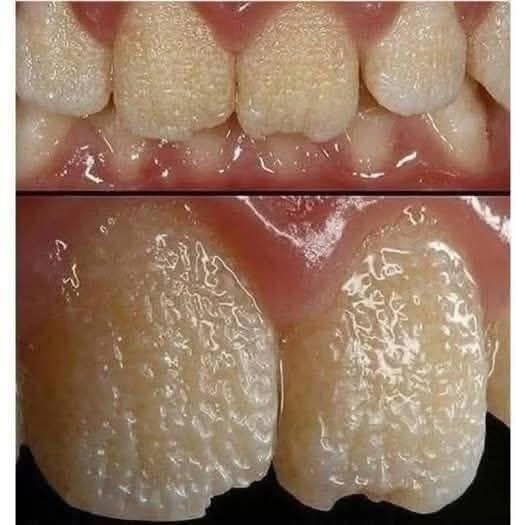What Exactly Is Amelogenesis Imperfecta?
Amelogenesis Imperfecta (AI) is a rare condition affecting tooth enamel, the hard outer layer that protects your teeth from damage and decay. Think of enamel as your teeth’s armor—it’s what gives them their shiny, smooth appearance and shields them from daily wear and tear. But with AI, it’s as though this armor went on strike during development, leaving your teeth vulnerable and uniquely flawed.
People with AI may experience thin, weak, or even missing enamel, which means their teeth don’t have the same level of protection as those with healthy enamel. This can lead to a variety of dental issues, including:
- Discoloration (teeth may appear yellow, brown, or translucent).
- Increased sensitivity to hot, cold, or sweet foods.
- Rapid wear and tear, leading to chipped or misshapen teeth.
- Higher risk of cavities and decay due to weakened enamel.
It’s like your teeth decided to go rogue and develop their own “custom look”—but unfortunately, it’s not the kind of custom look most people would choose.
How Does AI Happen?
AI isn’t caused by poor oral hygiene or something you did wrong—it’s entirely genetic. The condition arises from mutations in genes responsible for enamel formation. These mutations disrupt the normal process of amelogenesis, the stage where enamel develops on baby and adult teeth. Since AI is inherited, it often runs in families, meaning if someone in your family has it, there’s a chance you could too.
There are several types of AI, classified based on how the enamel is affected:
- Hypoplastic AI: Enamel is present but underdeveloped, making teeth appear small, pitted, or rough.
- Hypomaturation AI: Enamel is present but soft and poorly mineralized, causing discoloration and increased susceptibility to wear.
- Hypocalcified AI: Enamel forms initially but breaks down quickly after eruption, leaving teeth prone to decay and sensitivity.
Each type presents its own set of challenges, but all result in compromised enamel and the need for specialized dental care.
Living with AI: Challenges and Coping Strategies
Living with Amelogenesis Imperfecta can feel overwhelming, especially when everyday activities like eating or smiling become sources of discomfort or self-consciousness. However, many people with AI find ways to manage their condition effectively through a combination of professional treatment and lifestyle adjustments.
Dental Treatments for AI
Since AI affects enamel—a non-regenerative tissue—treatment focuses on protecting and restoring teeth. Common interventions include:
- Dental Bonding or Veneers: These cosmetic procedures help improve the appearance of teeth by covering imperfections and creating a smoother surface.
- Crowns: For severely damaged teeth, crowns provide both aesthetic and functional benefits by encasing the entire tooth.
- Fluoride Treatments: Regular fluoride applications can strengthen remaining enamel and reduce the risk of decay.
- Orthodontics: In cases where AI causes misalignment, braces or aligners may be recommended to straighten teeth.
Daily Care Tips
Managing AI requires extra attention to oral hygiene. Here are some tips to keep your teeth happy:
- Use a soft-bristled toothbrush to avoid further enamel erosion.
- Opt for desensitizing toothpaste to combat sensitivity.
- Avoid acidic foods and drinks (like soda and citrus) that can exacerbate enamel breakdown.
- Visit your dentist regularly for check-ups and preventive care.
Turning Challenges Into Confidence
While living with Amelogenesis Imperfecta comes with its share of difficulties, it’s important to remember that you’re not alone. Advances in dentistry mean there are more options than ever to restore both function and confidence to your smile. Many people with AI learn to embrace their unique dental journey, finding strength in overcoming obstacles and advocating for themselves.
So, the next time you catch yourself feeling frustrated about your teeth, remind yourself that they’re one-of-a-kind—and with the right care, they can still shine in their own way. After all, who needs ordinary when you can have extraordinary?
If you suspect you or a loved one might have AI, consult a dentist or genetic specialist for proper diagnosis and guidance. With knowledge and support, you can take control of your dental health and make peace with your smile—one step at a time.
Welcome to the world of Amelogenesis Imperfecta, where your teeth may be unusual, but your resilience is truly remarkable.
